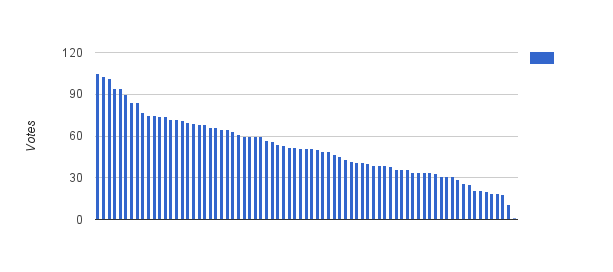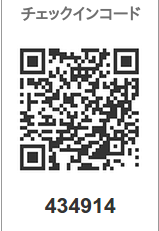Hi. This is @eed3si9n, one of the ScalaMatsuri staff. Although, I am a member of the Translation team, I like to participate in anything interesting from scheduling to swag items.
Summary
tl; dr. Here are the gist of this post.
- The voting will close at December 1st, 23:59 JST. Based on the submitted sessions, we are going to change the previous voting system to an “uncategorized voting.”
- The voting results will be interpreted more like a public opinion poll. In that, instead of picking the speakers purely based on the number of votes, ScalaMatsuri selection committee will pick up the mix of popular sessions, popular topics, as well as hand-picked sessions.
- This year’s voting will be available directly from the ScalaMatsuri website after logging in.
- If you’ve submitted a talk, and want to switch to another category, please let us know in the next few days via cfp2017@scalamatsuri.org.
A regional tech conference that's also global
As ScalaMatsuri made a huge progress in 2016, 2017 will continue to uphold the two major goals in a sustainable way:
- Providing a space for Japanese Scala community to socialize, and present ideas to the international audience.
- Make a global technical conference with the universal access, where people from various background such as languages, gender, or ethnicity, can be comfortable.
The concrete actions taken for these goals are documented in my last year’s post A regional tech conference that's also global, but here are the hightlights:
- Establishing Code of Conduct, and making an intro video for it.
- Public CFP, travel support, and translations of the submitted session abstracts.
- Public voting of the sessions.
- Subtitles on the slide decks and professional two-way interpretation.
My thoughts on how these went are written up in ScalaMatsuri as a lifestyle.
Revisiting the public voting
The ideas of public CFP and voting were adopted with inspiration from nescala, but for ScalaMatsuri that has many sessions over multiple tracks, we don’t think pure ballot yields the best result.
As it was the first trial, we first determined the number of sessions per each category of Japanese and English - sessions of 15 and 40 minute length. As we were too focused on making the language ratio 1:1, I think we ended up missing many of the 15 minutes talks that were popular.
Till date, there are 43 of 40 minute English proposals, 16 of 40 minute Japanese proposals, 9 of 15 minute English proposals, and 13 of 15 minutes Japanese proposals. I don’t think it would be best to fixate on picking eight 40 minute sessions and three 15 minute sessions.
Instead of determining the number of sessions up front per category, we might be able to schedule six 40 minute talks and eight 15 minute talks for Japanese given there are almost equal number of proposals. Really, the criteria that matters is “what the audience wants to see on the day of the conference.”
Uncategorized voting
To research “what the audience wants to see on the day of the conference,” ScalaMatsuri 2017 will adopt uncategorized voting. In other words, we will remove the categorization of English/Japanese 40/15 minutes, and you can pick whatever you want to see from all the proposals. One of the reasons we are even able to consider this, is because we have successfully implemented two-way interpretation. We no longer have to be nervous about the language barrier issue.
Because we reused the session proposal list from the last year, the page contains the “About voting” section, which states “The voting will be done for the following categories separately.” If you’ve submitted a talk, and want to switch to another category, please let us know in the next few days via cfp2017@scalamatsuri.org.
Public opinion poll
One point I want to clarify before we begin the voting this year, is that this year’s voting will be considered a public opinion poll.
Last year we observed that when hundreds of people try to select 22 sessions, the selected talks end up forming a cluster of similar topics. This is actually an obvious outcome because the voters did not talk to each other to coordinate “hey, let’s pick that talk for intro to fp.”
Another observation we made is that there was a pack of 6 or 8 talks that clearly got more votes than the others, but then the curve flattens to one or two votes difference.

In short, there was a clear top cluster of a few sessions that everyone wants to see, and the rest spread out widely. Combining these points, instead of picking talks from the top mathematically, we think the conference would be far more enjoyable if we treated the voting more like a public opinion poll to infer topics and trends. ScalaMatsuri selection committee will pick up the mix of popular sessions, popular topics, as well as hand-picked sessions with some degree of subjectiveness.
Voting program
One of the things we couldn’t do last year due to lack of time, was creating our own voting program. This year we commissioned Tech to Value to make the voting program. After logging in, you can now vote from the ScalaMatsuri website’s session proposal list.

You can vote by clicking on the ☆ icon. Since there are many sessions, you can first pin some of the candidates first using the pushpin icon.
How to vote
Participants who bought a ticket, sponsor companies and ScalaMatsuri staffs are eligible for voting. This article covers how participants can vote.
1.) Confirm your e-mail address that you used to buy the ticket, and the reception number in the e-mail you have received from DoorKeeper.

The email you have received from Doorkeeper contains the QR code with your reception number (your 6 digits number below the QR code). You will be asked to enter the reception number when you sign in. We will verify this code later to match up with your Google, Twitter, or Github account that you use to sign in.
If you haven't made the purchase yet, there are a few more tickets available from the following page: https://scalaconfjp.doorkeeper.jp/events/53530
2.) From the top right of the proposal list page, press the “Sign-in” button and sign in using your Google, Twitter, or GitHub account. (This will pop up an Authorize application dialog)
When you sign in, please enter the DoorKeeper reception number. This is it for the preparation.
Select the sessions you would like to see. The number of votes per person is limited to 10. The remaining votes will be displayed at the top of the proposal list page.
There are toggles to display only the voted and/or pinned sessions.

The voting will close on 1st, Dec. 23:59 JST. Any votes afterwards will be invalid, so please be sure to vote early.
3.) Get psyched waiting for the voting result!
Voting FAQ
Q.How will the voting result be announced?
A.We will announce the result at the ScalaMatsuri website.
We will also announce on the Twitter, so this might a good chance to start following us.
- Is there any extra chance to talk what if my proposal is not accepted?
You can propose your talk for our Unconference, which will be held on the second day of the conference (February 26, 2017). The talks are proposed and assigned on the day of the Unconference in the morning. We tend to have more sessions during the Unconference, so please bring your talks.
Please remember to vote!